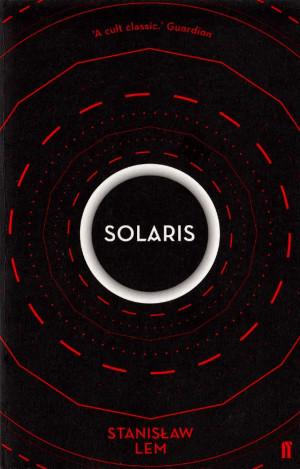
Solaris
by Stanisław Lem
Score: 4/5
Solaris is generally considered one of the greatest science-fiction novels ever written. Stanisław Lem (1921-2006), a Polish writer, published the novel in 1961 while the country was under Soviet control.
The story concerns the arrival of a scientist to a research station that sits above a vast ocean covering the whole of the planet Solaris. It is quickly apparent that all is not well: an unexplained death as well as erratic and unusual behaviour from the remaining two scientists. Extremely odd things are happening.
The "ocean" of Solaris is very different to anything on Earth: a chemical soup, organic, inorganic, colloidal. It displays unusual behaviour (to say the least), including forming huge structures within itself; these sometimes stretch many miles and are of huge complexity. It seems to exhibit intelligence. Is it sentient? This vast alien environment is the center of a large research effort and body of "Solarist" literature.
When you're in the mood to read a book, you are much more likely to enjoy it; something I have become much more aware of in the past few years. Being short also helps. Solaris is well written and the translation seems good (in my Faber&Faber edition the translators are Joanna Kilmartin and Steve Cox) but there are some sections that are more difficult. These are lengthy extracts from "Solarist" scientific research literature and are often dry and can be dull. Although my eyes glazed over occasionally, these writings did expand on the strangeness of the planet. It is still an environment I found very difficult to visualise however. This is a "first contact" story but of a "sideways" kind: the fact that the contact is with something we just cannot understand at all is the core of the book. It is eerie, even creepy, and our many questions are never really answered. Much like the scientists, we have a lot of theories about the planet, but no real idea of what is going on.
The novel is a short, sharp exploration of what a true "alien" contact might be and also a look at how humanity sees itself as it ventures out exploring the cosmos. The novel's been filmed twice now. I've seen neither film but will try to watch them sometime.

I've been trying my hand at linocut printing, perhaps the easiest sort to do at home. I've been wanting to try printing for a long time. There's no need for a course of training or in-person instruction: just have a go. It's quite easy to get something on paper quickly (even if just basic shapes) and it is cheap to get going as well. YouTube is full of instructional videos.
Right: My fourth lino print, and my first done in more than one colour.
I've now done about five prints, including a couple in multiple colours, one of which you can see to the right.
The colour prints are created using the reduction method: the first (usually lightest) colour is rolled and printed, then you cut out a little more lino where you want to keep this colour. Then roll the next colour and print again. Things can go wrong ... but so far not in a ruinous way!
In the picture below you can see the three stages of the three colour print "owl2": firstly turquoise (right-most), then, going right to left, the second colour blue added and then black to complete. The lino block is shown above the prints alongside the cutting tool I used.
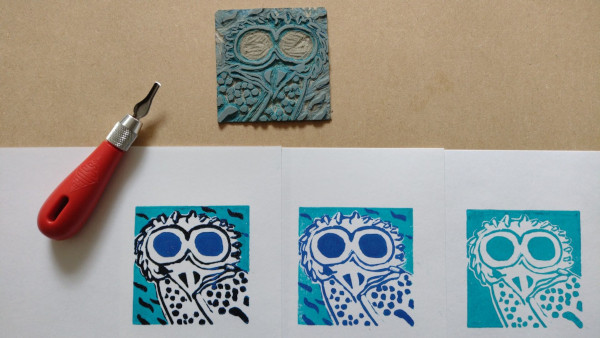
Like any creative endeavour, practice is what gets you better. Right now I'm back to an oil painting but linocut printing is great fun. The focus of carving the block feels a little like a form of meditation. Time passes quickly.

Above:Edinburgh North Bridge and Salisbury Crags, oil
I visited the City Art Centre at the weekend to see their exhibition Adam Bruce Thomson: The Quiet Path. Thomson is a little known Edinburgh artist of the 20th Century.
The "quiet path" is a reference to his unassuming nature and low profile. Thomson (1885-1976) was an Edinburgh born artist and spent almost his entire life in the city, including a long spell teaching at Edinburgh College of Art. The college was formed in its present state (and site) in 1907, and Thomson was a student himself in the early days.
The exhibition is over two floors and shows his flexibility in oil paint, drawing and print making. I was also particularly drawn to some great pastel pictures, colourful and bright.
Adam Bruce Thomson is much less known today than some of his more famous contemporaries and that is a shame. Hopefully this small exhibition raises his profile because he deserves a wider audience.
The exhibition runs at the City Art Centre in Edinburgh until Sunday October 6th 2024 and is free.

Above:The Road to Ben Cruachan, 1932, oil

Above:Trees and Cattle, Colvend, 1920's, pastel

Above:The Old Dean Bridge, 1932, oil

Piranesi
By Susanna Clarke
Score: 3/5
Susanna Clarke had quite a bit of success with her 2004 novel Jonathan Strange & Mr Norrell. I liked it, but it's a long book and I had to slog through some of it. You need to be in the right mood to immerse yourself in an alternate magic-suffused Victorian world, with a writing style to match.
Piranesi is her most recent novel, published in 2021. This is a much shorter book, less than 300 pages, but in a similar vein to Jonathan Strange: quite strange and fantastical. A man wanders around a large, many roomed mansion "house", multi-levelled, ramshackle in parts and containing hundreds of strange statues. Some statues on plinths and some seemingly bursting through the walls. With an occasional missing roof, the rain and low cloud might chill the air, and the sea can come crashing through the building. He seems to have a rough and mean form of existence but, child-like, he seems happy enough.
It is quite hallucinatory and odd; some form of larger picture emerges slowly from Clarke's careful interleaving of fragments the "Piranesi" character puts together over the course of time. This is not reality as we know it.
What I most like about Clarke's writing is her positioning of "magic" as being something that is far from the modern conception: a bit of a conjuring trick, superficial entertainment or illusion. Magic is a more primal aspect of the natural world and something to be very wary of indeed. It can be beautiful, perhaps wondrous but also awful and frightening. A "fairy" in this world (see Jonathan Strange and Mr Norrell in particular) might be intelligent as well as completely malevolent. You don't want one to take a dislike to you. There are no fairies in Piranesi but there are dark undercurrents of hidden or forgotten knowledge; perhaps best left that way. Beguiling and strange, it was short enough to stay interesting until the end. An enjoyable distraction from the modern world.
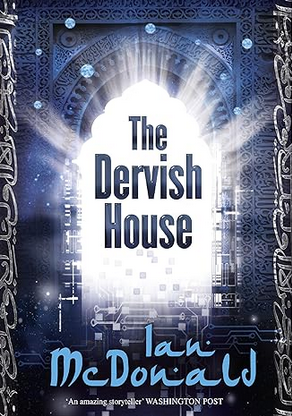
The Dervish House
By Ian McDonald
Score: 5/5
It's sometimes the case that I read a book, want to review it but either never get round to it, or start a review and never finish it. For a book I enjoyed as much as The Dervish House by Ian McDonald, I really need to make that extra effort. This 2011 novel deserves high praise.
It is a little different from the start: the setting is a near future Istanbul, a city with a vast history and a multitude of stories. The novel has been classed as "sci-fi", even a form of "cyberpunk", but designations such as these, like so many genre pigeon-hole's, do it a disservice. Yes, there are some futuristic elements: advanced personal technology, nano-technology, AI. And we mustn't forget the shape-shifting robots! But it takes these elements and treats them the same way we treat our smart-phones, crypto-currency and AI chat-bots. They're part of the scenery, or a child's toy.
Whatever the genre, it's a thriller and adventure story. A nano startup chasing financial investment and also a missing "document" essential to this. A wheeler and dealer commodity trader trying to pull off a less than straight-up deal. A hunt for a mysterious historical artifact, perhaps only a legend. A bomb on a tram that might cause more than physical damage. A boy's dangerous game spying on people who have a monstrous plan. And an old man with a chance at getting back at a past tormentor and perhaps a reconciliation with a lost love. There is lots going on and many threads to keep our interest, with a small cast of believable, funny and colourful characters. I think I did laugh out loud at least once.
There's action, emotion and tension but what raises the book far above the average is the setting in the ancient city and our immersion in it, old meeting the new. A very good, well written novel and an author I will be sure to pick up again.
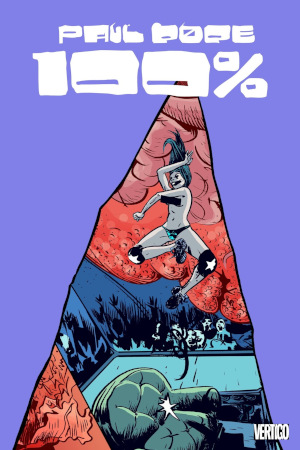
I've recently finished reading Paul Pope's graphic novel "100%". I thought it was excellent.
I hadn't heard of Pope or seen anything by him until I saw a video review of the first issue of his 1995 comic "THB" on the Cartoonist Kayfabe channel. The channel's been a source of some great material and I hope it manages to survive the recent terrible events.
THB is a very early Pope comic, self-published from the mid-1990's. As soon as the boys opened it up it was intriguing: different just looking at the title and graphic design. The first thing I noticed about the art was the fluidity of the ink style, quite obviously brush driven rather than pen. Using a brush for inking is much less common, even back before digital production took off.
"100%" dates from the early 2000's but, again, you can see the dynamic black and white brush-work and his recognisable style in full effect. There's an organic quality that I think only a brush can fully exhibit. There is a "Paul Pope" face and figure style.
On top of the great comic art, the actual story itself is good. The story is an aspect of a comic that is often less developed, if not sometimes puerile (with some notable exceptions of course). Adults need something better and "100%" is that, just don't expect superheroes or explosions. From what I can see, Pope does pretty well selling original art as well. Definitely someone worth reading.


I saw Hawkwind live in concert last weekend. I haven't seen them live in years: decades in fact. Dave Brock is the cornerstone of the band of course and the last remaining original. He might be creaking a bit, but at 82 you have to give him huge respect for keeping things going and doing his bit for psychedelic space-rock. He looked good and played well: I hope I'm as fit as he is when I reach that age.
"Spirit of the Age" from the album Quark, Strangeness and Charm, stood out for me. I don't think I've ever heard it live before. That was a great album and definitely hugely enhanced by Robert Calvert's song writing. Great to hear it live.
I missed out on their last concert up here (their 50th anniversary tour) and was kicking myself for not going. Not even Hawkwind can go on forever but, luckily for me, they don't know when to stop touring. And good luck to them.


I have factory reset my tablet again yesterday (April 8th). The Economist app has started crashing too much again. How much? It crashed 4-5 times while I was trying to read an article at lunchtime: I'd restart the app (with all the delays that involves), go back into the article (more delay) and then maybe get 10 secs and then a crash again. Repeat. I gave up that article. As I detailed before, I'm back in the same hole.
My last factory reset was back in February 2024 :
2024-02-07 --- factory reset .. 2024-03-09 --- crash 2024-03-13 --- crash - then crashes on 16,25,27 2024-03-29 --- x2 crash - then once each day .. 2024-04-06 --- x3 2024-04-07 --- x4 2024-04-08 --- x5+
So it looks like I get about 4 weeks of decent behaviour but then a slowly degrading experience for the next few weeks. I'll see how this reset goes. Would I carry on paying for this? Maybe, assuming the discount I got. But it is wearing thin. I'll have to decide in September.
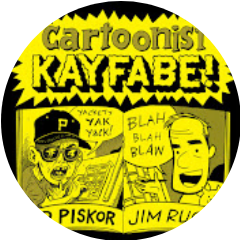
Like many people, I was shocked earlier in the week to read about the accusations against Ed Piskor, comic book creator and half of the Cartoonist Kayfabe YouTube channel. But it was just terrible to see that he then killed himself two days later. Just absolutely appalling. I am still trying to process it. Ed and his channel co-host Jim Rugg have been constant companions to me over the last few years: I've watched and listened to the channel very regularly, particularly when I paint. They started as pandemic lockdown companions. Ed loved comics: their creation, the artistic process, techniques involved, the business, the history, everything. An infectious enthusiasm.
I have to say that my heart goes out to his family first and foremost. Also to Jim Rugg, the other half of the channel, who must be devastated over the turn of events this week. What a tragedy this has been. I'll miss Ed a lot.
The Lambiek folks have an overview of his life, work and death. Also, the Comics Journal.
What a terrible week.
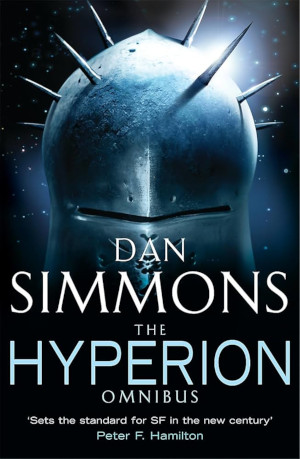
Hyperion / The Fall of Hyperion
Endymion / The Rise of Endymion
By Dan Simmons
Score: 5/5
Good Friday was a very apt time to finish reading the Hyperion/Endymion novels by Dan Simmons. There are clear parallels to Easter here that become very apparent as Endymion reaches its climax. Like the biblical story, the culmination of Rise of Endymion is horrifying and absolutely devastating.
These are long books (I read the four novels in the two volume omnibus editions): each book approaches or surpasses 400 pages, so there is a significant investment needed to read these. Following the characters over so many pages means you develop a relationship with them, perhaps love. As I reached the end, I felt a strong emotional response, even choking up to a degree. Great stories can have this effect. A very good book.
The Hyperion series is much more than a "space opera", although it spans the galaxy. As Aenea says to Raul at some point: Love is the Prime Mover of the universe. The gospel she "preaches" is one of non-violence and the core of the book is actually humanity, even humanism, but nothing supernatural. So, more than a space travel action-adventure but there is fast paced and bloody action, tremendous violence, demon-like non-human entities, "AI" and "time travel". There is something for everyone if you are in the right frame of mind. Wait until you are and you will not be disappointed.
I considered reducing the score and penalising for the length of the books (i.e. rating a 4/5). I think they are a little too long in fact. However, the final account makes up for this in my mind and deserve top marks. I do not mean to imply 5/5 makes them perfect.
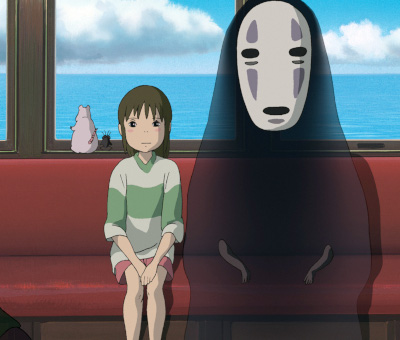
Now for some more Japanese culture, this time animation, also known as anime.
The most famous Japanese anime studio is Studio Ghibli, a company I've come across many times but never seen any of their films. A lot of people really love the stuff they make. As I've said, I've never had much interest in manga, or anime, but I've been been intrigued enough now that I decided I should should watch one. I recently saw Spirited Away, one of their most popular productions (and also a 2003 Oscar winner).
It's a simple story about a young girl separated from her parents and trapped in a ghostly world of spirits, complete with magical people, weird entities and strange creatures. The world appears centered on a large bath-house run by a witch and the little girl has to find a job and work out how to escape and save her family.
Well, I really loved the film, enjoying it immensely. Charming and beautifully made "cell" animation, I can see why the the Ghibli "style" is such a worldwide success. There's a bit of a "signature" style, a traditional animation look alongside atmospheric painted backgrounds. I can understand a film like this being a big hit for both children and adults. Funny moments but also themes that tug at the core human emotions of love, loneliness and loyalty. It's also a refreshing change to see a film informed by Japanese cultural traditions even though it speaks to universal traits.
A film easy for me to recommend wholeheartedly. I will try and watch another Studio Ghibli production.
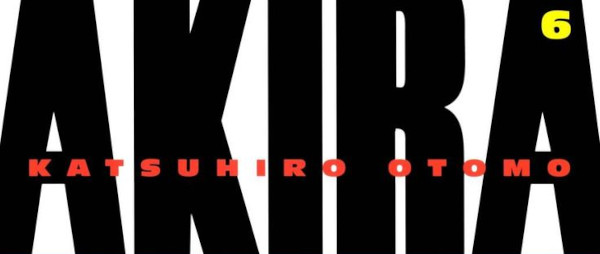
I finished reading Akira a couple of weeks ago, getting through the last of the six volumes. A very impressive work and I thoroughly enjoyed it. As I mentioned recently, there's never a dull moment, the story moves quickly, there's a lot of action and, of course, the art work is exceptional. What surprised me somewhat was the writing: it was much better than I expected and not in the least "childish", even if it has to be a little basic at times. A comic strip is a lot more than just the drawing, even though that is always the most visceral and accessible aspect of the work. This was easy to read and had a satisfying and moving conclusion. I completely understand its classic status.
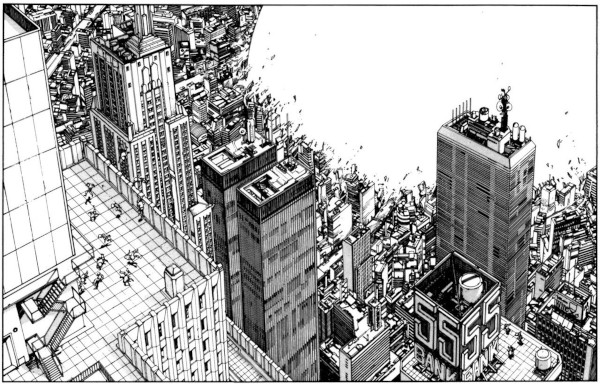
Katsuhiro Otomo's art is detailed and dynamic. He really puts Neo-Tokyo and its inhabitants through the wringer with great drawings of buildings, destruction, military hardware, motorbikes, guns. Did I mention destruction? Masterful stuff. The one small criticism I have it that sometimes it was a little hard to see what happening in a panel there was so much detail. But this is a work worth paying attention to.
A wonderful book that I'm glad to have finally read. Perhaps I'm of an age that I really appreciate the whole package now but I would recommend it to any age group, teenage and up.
I am yet to see the animé film, but I am told it is good. Something to look forward to.

I recently wrote about my poor experience with The Economist android app. Well, since a factory reset, I'm happy that things have improved immensely. It is still somewhat slow and unresponsive, but the main problem I had was the crashing, and this has (mostly) stopped.
I did the reset on February 7th. I got my first app crash on March 9th, so got about four weeks of relatively pain free reading. Since then, I've had two crashes in the past week, so possibly a sign things are degrading a bit again. The app is still a bit slow and annoying sometimes but at least I now get a chance to read the articles. And this makes a huge difference. I'll see how it goes over the next week or so. This level of performance is just about "good enough" for me.

Above: library problems. Photo: Christine Ro (via BBC web site)
I recently wrote about ransomware and paid some attention to the British Library's current problem with this scourge. Well, a BBC article (Why some cyber-attacks hit harder than others) returns to the scene and covers the continuing issues and costs being borne. It's a sorry state of affairs. Looks like people are having to order books with paper forms and the digital media is still offline.
The Russian hacker group Rhysida claimed responsibility, and demanded a ransom of 20 bitcoin (equivalent to £600,000 at the time). After the British Library refused to pay up, and following an online auction of stolen data, the hackers leaked the nearly 600 GB of private information on the dark web.
Of course, Russia. The country has long been a center of criminal "hacking", state sponsored and private enterprise. Russian authorities look the other way as long as these groups don't attack Russia itself; maybe the state will co-opt or sponsor the activity. China is another major offender. The New York Times via the archive site:
Leaked Files Show the Secret World of China’s Hackers for Hire
The Chinese government’s use of private contractors to hack on its behalf borrows from the tactics of Iran and Russia, which for years have turned to nongovernmental entities to go after commercial and official targets. Although the scattershot approach to state espionage can be more effective, it has also proved harder to control. Some Chinese contractors have used malware to extort ransoms from private companies, even while working for China’s spy agency.
The problem we have is that computer and network security is hard. As well as the actual "technical" mitigations we can use (e.g. spam filters, firewalls), people themselves are usually a weak link. Anyone can be misdirected or scammed, even "experts". And almost everything is connected to the internet today, including everything that keeps civilisation actually "civilised" and people alive. Let's hope things don't get worse. And to be clear, I don't think ransoms should be paid because it just encourages these attacks.
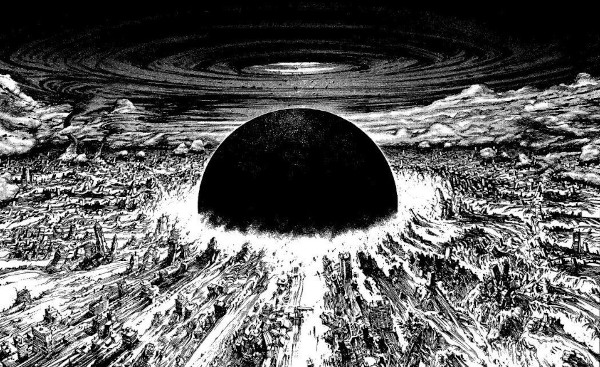
Above: Akira - The bomb
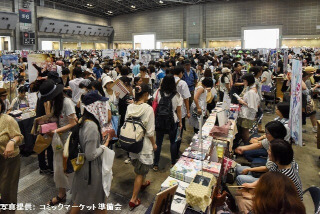
Above: Comiket Tokyo, a huge Japanese comic fair held
multiple times a year.
Comics are still a big industry and the largest in the world is in Japan, followed by France and the USA. Japan has a long history with comics (Manga) and the market there is huge with lots of physical comic books sold and massive Manga shows. I've been watching the Cartoonist Kayfabe YouTube channel and my eyes have been opened to just how big comics are over there.
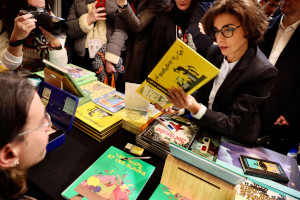
France is the second largest market for comic books (called "Bande Dessinée" or "BD"). The Guardian have a decent article online about the large comic convention held in Angoulême, France, every year:
France’s comic-book tradition is hitting new heights.
Left: At the Angoulême comics fair. Photo credit: Yohan Bonnet/AFP/Getty Images in The Guardian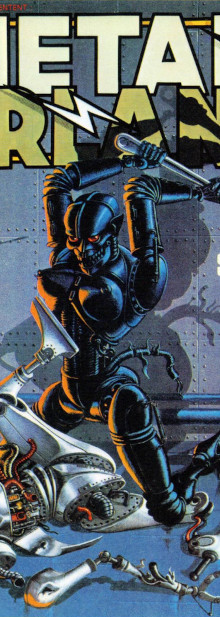
Like the Japanese, the French do comics differently to us in the UK. Whereas the UK public has mostly seen "comics" as a form of entertainment for children, the French have seen comics as an art form and, as such, given them much more respect. The gap in perception has narrowed over the past two decades but I suspect it is still there. When I first looked at French comics the difference in the culture was like night and day. In the 1980's I started to read BD by the likes of Moebius, Bilal and Druillet: the French magazine Métal Hurlant was seminal at this time (and its American cousin Heavy Metal). Manga has made big inroads to the French market over the past few years: over half the market according to The Guardian article.
Right: Métal Hurlant no.8. Cover (detail) by Jean-Michel Nicollet.
With manga, I certainly looked at it back in the day (mid-80's) but I think this was just before of the good sort was available.
I just couldn't get past the way faces and eyes were drawn, or the often childish looking characters. Looking back now, I know I jumped to
entirely wrong conclusions, but with so many other great comics coming online to me at the time, I never found time to take another
look.
One of the best known Japanese comics, and perhaps the biggest hit of them all, is Katsuhiro Otomo's Akira, first published in Japan in 1982 with a first edition in English (Marvel's Epic line) in 1988. To many, this was the book that completely changed their perception of manga.
I might have glanced at Akira years ago but it would have been a superficial look. The guys on the Kayfabe channel are massive fans of Otomo and have been going through his comics and paying serious and deserved attention to their quality. It's been enough to have me taking a proper look. I've been lucky that my library (Edinburgh Central) has a fairly decent selection of comics and graphics novels so, when I saw they had the first few Akira volumes on the shelf, I knew what I had to do.
I've now read volumes one and two, and have three and four out on loan to read. Each is a thick black and white book but not heavy going in any way and the story moves along briskly. It's set in a near future "Neo-Tokyo", rebuilt a few decades after a World War and after massive devastation caused by a "new type" of bomb dropped at its center (see top image). A cyber-punk type future we've seen a lot more of now but here is a well paced story, fresh and well written, with great art. Otomo excels at detailed buildings and backgrounds, machines and action.
The comic reads surprisingly well and looks beautiful too: I am ashamed I took so long to pick it up but would recommend it to anyone.
Below: A panel from Akira. © Katsuhiro Otomo.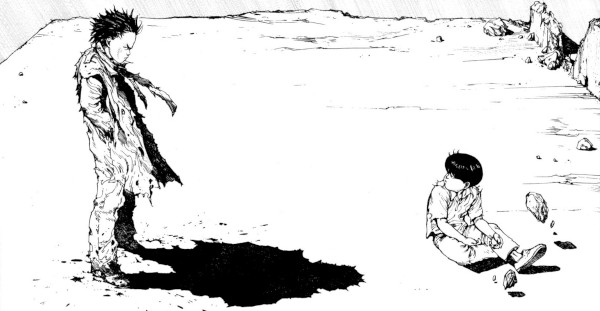

My tablet has taken to telling me something I am painfully aware of. The Economist android app crashes. A lot. In fact, it crashed over ten times for me at lunchtime yesterday. Given that it is also very slow, it takes a long time to start it up and get to a point I can attempt to read something again (it also loses the current article). It might crash again before I even get to the article again, if I can find it (it sometimes rearranges the home page and hides stuff). This is the way it is every day now.
I like The Economist magazine in general and have been a subscriber for many years now. I still find the writing good and explanations of current affairs and business excellent, even if I am a bit less aligned with it on some issues than I used to be. However, given the problems reading it, I will not extend my subscription again later this year.
I am also far from the only one having a problem. If you head over to the Google Play Store and look up the Economist App, you will see many people saying very similar things. This needs to be addressed or people will stop buying it. Fundamentally, what do we have here? A collection of text and images on pages wrapped in a "magazine". How hard is this? It is a solved problem.
I read on a Samsung Galaxy Tab A, from 2018. It has 3 GB RAM and 32GB storage. I use it only for the Economist app now. I see no reason why the Economist app should not work on this. If they really need to stretch the limits of what this tablet supports (but why?), give us a "lite" version. I refuse to buy another tablet just to read a "magazine".
I have tried a factory reset of the tablet. Things improved for a few days but started getting bad again soon after.
Here are some of the things wrong :
- The app is very slow and often unresponsive.
It is hard to tell if you've "clicked" the link and have to retry a lot. Finally, after a 10 second wait, maybe it will work. - The app crashes a lot (see above).
- The app "resets" itself to the home screen.
It rarely remembers your place in an article so you have to find it yourself, which is slow. - The downloaded issue has the same problems.
I've stopped trying to go through the "weekly" edition because it is even slower to get into. Even having supposedly "downloaded" it, you would not know. Everything behaves the same and a constant appearance of needing to download or refresh content. It's not just the ads.
- The "weekly" page usually shows me the wrong (previous) week. Selecting "Browse Editions" might refresh (slowly) and show all the available editions but does not let me select the new edition: it shows me the previous one again.
So, I have just about had enough. My subscription is good until the autumn but I will not pay money again for this horrible, frustrating experience. I will call their help center and let them know. I'd like my money back.

An Update
I've just done another factory reset, reinstalled the app from thePlay Store and logged in. I used it at lunchtime and, although the app was a bit slow and unresponsive to "clicks", it behaved better. It didn't crash once, which is the most important thing to me. I actually managed to read a few articles and not feel angry or frustrated at the end of my lunchtime. I'll see how it goes for the next few days.
The British Library has had a big problem recently, as they were saying throughout their web site :
We're continuing to experience a major technology outage as a result of a cyber-attack. Our buildings are open as usual, however, the outage is still affecting our website, online systems and services, as well as some onsite services. This is a temporary website, with limited content outlining the services that are currently available, as well as what's on at the Library.
This has been the case for weeks although it appears they are restoring some services now.
I've been reading about "ransom ware" cyber-attacks for a few years now: this is when an attacker gets access to a computer system, server or network and encrypts (scrambles) the files and data so the systems are unusable. They then demand money to unlock the data. Perhaps money not to leak the data online in public. This sort of attack has affected hospitals, businesses and government. It's getting worse. So bad in fact, that people are waking up to the National Security implications.
The Economist had a recent article about the problem (How ransomware could cripple countries, not just companies) and one of the things it mentioned was the fact that Bitcoin, a hard to track anonymous digital currency, is one of the things that made the problem much worse. In fact, Bitcoin is a major enabler of the crime :
The hardest part of a ransomware attack was once cashing out and laundering the ransom. Attackers would have to buy high-end goods using stolen banking credentials and sell them on the black market in Russia, losing perhaps 60-70% of the profit along the way. Cryptocurrency has enabled them to cash out immediately with little risk.
With everything increasingly connected (think "5G"), and network and computer security so poor (for many reasons), it might get very bumpy. Let's not talk about war.
Last week I came across yet another media report of ransonware : infecting a Bosch Torque wrench ("Handheld Nutrunner NXA015S-B 3-15NM"). This was detailed in a post on ArsTechnica.
My initial reaction was a bit of amusement: an internet connected wrench? But maybe a modern manufacturing business has a good case for logging or setting all sorts of things over a network: this was even part of the case for "5G" networks. But if so much of modern life is now network connected, how screwed will we be if it is attacked, compromised and rendered unusable?
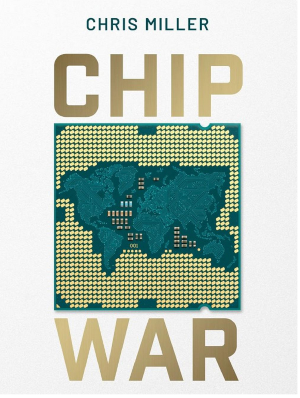
Chip War
By Chris Miller
Score: 5/5
I've finished reading Chris Miller's Chip War, the history of the semiconductor industry. This is one of the best books I've read for a long time. It is much more than just a history though.
Semiconductors are a (perhaps the) foundation of modern life and are now present in almost everything manufactured, not just computer processors (CPU's). Also chips for networking (including wifi), communications, manufacturing, medical, power. And weapon systems.
So from the physics, to the engineering, manufacturing, supply chains and logistics, we have an essential technology, globalised and now wrapped up in "Great Power" competition. The book is almost up to date and climaxes with the US/China rupture over trade and technology, with the US now awake to the Chinese threat to their continued technological domination. It is almost gripping.
The technology now used to create these devices is breathtaking. Arthur C. Clarke's said :
Any sufficiently advanced technology is indistinguishable from magic
Reading this book, particularly the chapter on the Extreme Ultraviolet (EUV) Lithography process, brought this old quote to mind on a few occasions. The world is full of "magical" technology today but we barely recognise it as such because we are so used to it.
One scientist called the development of EUV as "what felt like infinite money for solving an impossible problem". This research had been going on for decades and some people didn't think it was actually possible. The scale of the latest transistors (the building block of everything) was getting so small (tens of nanometres (nm)) that the wavelength of light needed to "etch" them was also getting so tiny that quantum effects can cause problems. Some very advanced science is needed today at the cutting edge.
For instance: just producing the light needed for the process now is very difficult. This development originated with a US company called Cymer; experts in laser light sources. From the book :
The company's engineers realised the best approach was to shoot a tiny ball of tin measuring thirty-millionths of a meter wide moving through a vacuum at speeds of around two hundred miles per hour. The tin is then struck twice with a laser, the first pulse to warm it up, the second to blast it into a plasma with a temperature around half a million degrees, many times hotter than the surface of the sun. This process of blasting tin is then repeated fifty-thousand times per second to produce EUV light in the quantities necessary to fabricate chips.
Approaching magic? Well, we're certainly getting close.

This laser had to be designed and built: it didn't exist. This in itself is a marvel of engineering. The people that built it: a German company called Trumpf. Their web site includes a picture of this (shown on the right).
The actual EUV machine itself is built by a Dutch company called ASML. The technology involved is well described on their own page. It is one of the most complex machines ever built and not only very expensive (we are talking hundreds of millions dollars) but increasingly wrapped up in the new hard rules on export imposed by the US.
Below: The ASML EUV Lithography system :

Although the likes of the Taiwan Semiconductor Manufacturing Company (TSMC) are the undisputed kings of silicon chip fabrication in 2023 (and this is unlikely to change in the near or even medium term), the USA still has a huge amount of leverage over the industry and many chip "choke" points. The dilemma is that Taiwan, like South Korea and Holland, are allies of the US, so to target China or claw back manufacturing onshore, means treading a very fine line.
The consequences of a Chinese war for Taiwan would likely be absolutely disastrous for the world due to the impact on the the silicon chip supply. Not just logic chips, but memory and NAND (flash) as well. A severe impact which will affect everyone very badly. This is a dangerous piece of history playing out right now, and as Miller says in the book, Taiwan is the "beating heart of the digital world".
Great book.
Over the years, you see and recognise the same painters and can watch them get better over time. Some artists paint in a very realistic style, which is impressive from a technical point of view and sometimes also produces a beautiful work of art. Occasionally, a "hyper real" style can seem too much like a photograph and this is probably a common criticism. My take is that the ends justify the means and if the ends look like this work by Lucy McKie then I'm very glad to see it. Colour, composition and technique come together to create something beautiful.

Above: Blue Jug with Two Lemons, Lucy McKie, 25 x 35 cm, Oil.
You can see this work at the Mall Galleries site. Make sure you look through the rest of the Royal Institute of Oil Painters 2023 exhibition to see much more by some great artists.

I'm reading the book Chip War by Chris Miller, about the history of the semiconductor industry. It looks at technology, logistics and at the increasingly fraught politics of the manufacture of advanced computer chips.
I know some of the history here, especially from a Silicon Valley and USA perspective, but there's plenty I'm learning (and I am only a quarter of the way through the book). A trivial example: I'd never thought of the origin or meaning of the term computer "chip". It turns out that it's from the way the integrated circuits were all created on a single piece of silicon and then each individual circuit was "chipped" off the whole to make the part.
A huge amount of very innovative work was done in the semiconductor and transistor field in the fifties and sixties and it continues to this day. The technology is, in some ways, almost indistinguishable from magic.




